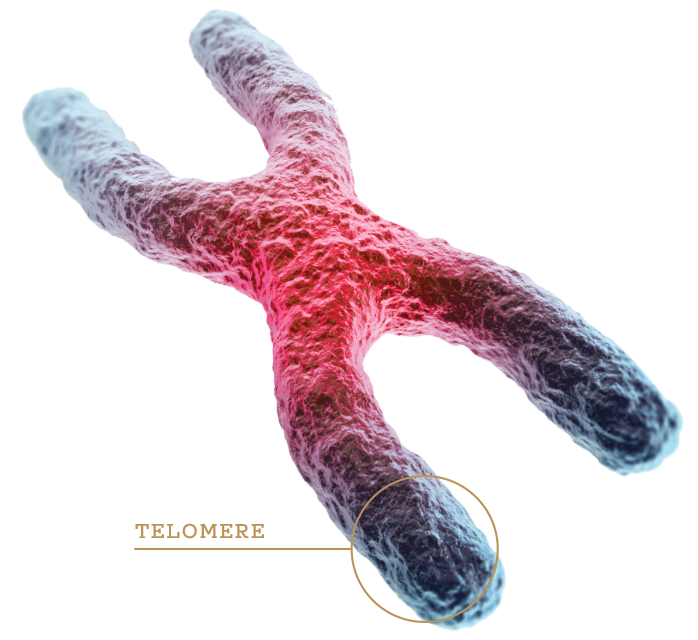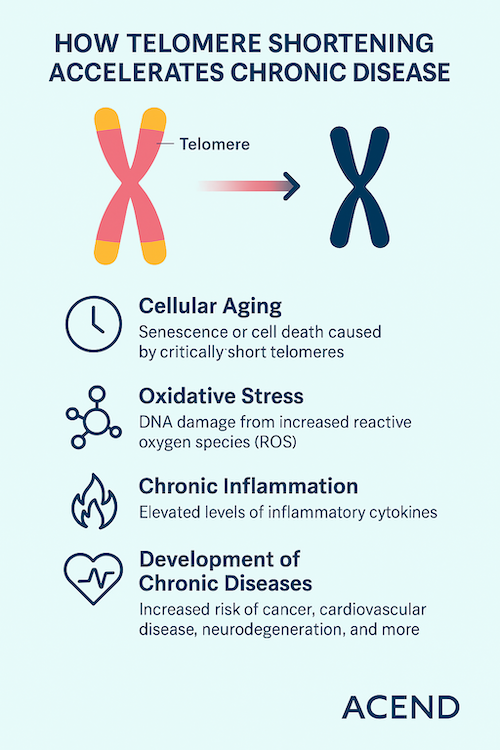Telomeres and Chronic Disease: The New Frontier in Healthy Aging

Telomeres may be the reflection of how you are aging
June 3, 2025
Contributing Authors: Team TRILITY / ACEND
In the modern quest for longevity, a surprising player has emerged from the microscopic depths of our cells: telomeres. These protective caps at the ends of chromosomes may be one of the most accurate biomarkers of biological aging—and their length and integrity are increasingly being linked to chronic disease management, including in cancer, cardiovascular disease, neurodegeneration, and more.
Understanding telomeres not only opens a new chapter in anti-aging research but provides critical insight into how lifestyle, inflammation, and nutrient intake influence our healthspan. Let’s briefly explore why telomeres matter, how chronic inflammation shortens them, and how medical foods like ACEND may offer protective nutritional strategies to preserve telomere length and promote cellular resilience.
What Are Telomeres?
A very common analogy is to imagine your DNA as a shoelace. At the ends are plastic tips—those are your telomeres, specialized DNA-protein structures that protect chromosomes from fraying, fusing, or degrading. Every time a cell divides, telomeres shorten. When they become critically short, the cell enters senescence (biological aging) or dies altogether.
Over time, excessive telomere shortening is associated with:
-
Impaired immune function
-
Increased oxidative stress
-
Chronic inflammatory response
-
Higher risk for age-related diseases
In essence, telomeres are a biological clock that doesn’t just count the years—it tracks cumulative cellular damage.
Telomere Length and Chronic Disease
1. Cardiovascular Disease
Short telomeres are independently associated with hypertension, coronary artery disease, and heart failure. A study published in Circulation Research demonstrated that individuals with shorter leukocyte telomere length had a significantly higher risk of cardiovascular events and mortality .
2. Cancer
Telomere dysfunction leads to genomic instability, which plays a crucial role in the initiation and progression of cancer. Telomere attrition in epithelial cells, for example, is a precursor event in prostate, breast, and gastrointestinal cancers .
3. Neurodegenerative Diseases
Telomere shortening is observed in individuals with Alzheimer’s and Parkinson’s disease. As neurons are post-mitotic and rarely divide, their telomere dynamics reflect broader neuroinflammatory processes and oxidative stress .
4. Type 2 Diabetes and Metabolic Syndrome
Increased insulin resistance and chronic low-grade inflammation—hallmarks of metabolic dysfunction—are tightly associated with shorter telomeres. The link suggests a two-way relationship: inflammation promotes telomere erosion, and in turn, shortened telomeres contribute to pancreatic beta-cell aging and metabolic decline .
Telomere Attrition: Driven by Inflammation and Oxidative Stress
One of the primary mechanisms behind telomere shortening is chronic inflammation, or “inflammaging,” which underscores the need for chronic inflammation support..” Persistent low-grade inflammation generates reactive oxygen species (ROS) that damage DNA—including telomeric regions that are especially vulnerable.
Key inflammatory markers like IL-6, TNF-α, and CRP are not only elevated in age-related diseases but also correlate with faster telomere attrition . Therefore, inflammation isn’t just a symptom of aging—it is a driver of biological aging itself.
The Role of Nutrition in Telomere Maintenance

Research continues to highlight the influence of diet on telomere health. Nutrients that are antioxidant-rich, anti-inflammatory, and mitochondria-supportive can slow the rate of telomere shortening.
Key Nutritional Strategies:
-
Polyphenols (e.g., quercetin, epicatechin, luteolin): Shown to reduce oxidative stress and modulate inflammatory pathways that contribute to telomere attrition.
-
Omega-3 fatty acids: Linked to lower telomere shortening over time.
-
Vitamins C, D, and E: Offer antioxidant support and immune modulation.
-
Magnesium and Zinc: Involved in DNA repair and telomerase activity.
A recent review in The American Journal of Medicine underscores that diets high in whole foods and antioxidants—like the Mediterranean diet—are associated with longer telomeres and decreased risk of chronic disease .
Telomeres, the Gut, and the Brain
An emerging body of science is now linking gut microbiome diversity to telomere length. Certain strains of beneficial bacteria (e.g., Bifidobacterium, Lactobacillus) have been associated with reduced systemic inflammation and longer telomeres. This opens new avenues to modulate aging via the gut-brain axis, reinforcing the systemic nature of cellular aging .
How ACEND Supports Telomere Integrity
ACEND, a clinically formulated medical food, is a targeted inflammation control formula uniquely positioned to combat the root causes of telomere attrition by reducing inflammation, replenishing antioxidant defenses, and restoring mitochondrial health.
Key ACEND Ingredients for Telomere Health:
-
Quercetin Dihydrate – A potent polyphenol known to lower inflammatory markers such as IL-6 and TNF-α and protect DNA from oxidative damage.
-
Luteolin – Inhibits COX-2 and NF-κB activation, offering cellular anti-aging effects.
-
Vitamin D3 – Supports immune regulation and has been associated with longer telomere length in epidemiological studies.
-
Astaxanthin – A lipid-soluble antioxidant with neuroprotective and telomere-preserving effects.
-
N-Acetyl L-Cysteine (NAC) – Precursor to glutathione, reduces oxidative stress at the nuclear level.
-
Grape Seed Extract (95% proanthocyanidins) – Inhibits oxidative stress and promotes DNA stability.
Together, these compounds help address telomere attrition at the root—targeting inflammation, oxidative damage, and mitochondrial dysfunction, which are the biochemical engines behind premature aging and chronic disease onset.

Telomeres and healthy aging
Learn more about ACEND’s full polyphenol and bioactive profile in our article:
The Microbiome-Mitochondria-Inflammation Trifecta
Can Polyphenols Improve Sleep?
What Comes Next: Telomere Science and the Future of Longevity
With advances in telomere biology and the tools to measure biological age, the next frontier lies in applying targeted lifestyle and medical food interventions to maintain telomere integrity. This includes:
-
Reducing exposure to telomere-damaging toxins like microplastics and air pollutants
-
Enhancing circadian regulation through sleep and time-restricted eating
-
Using advanced polyphenol therapies, like those found in ACEND, to reduce inflammation systemically
Telomere maintenance may soon become a standard measure of anti-aging therapies. Just as we test cholesterol for heart health, telomere length could become a marker for our total biological reserve.
Let’s provide the analogy; if chronic disease is the storm of modern aging, then telomeres are the weather report—and nutrition is the umbrella. Protecting your telomeres may be one of the smartest, most science-backed ways to improve healthspan.
And in that pursuit, medical foods like ACEND are designed not just to treat symptoms, but to strengthen cellular defense systems from the inside out—one chromosome at a time.
References:
ScienceDirect article on vitamin D and telomeres
Other articles you may enjoy:
-
Can Polyphenols Improve Sleep? Emerging Insights into Flavonoids and Brain Health
Note: Always consult with a healthcare professional before considering any treatment options or significant dietary changes.